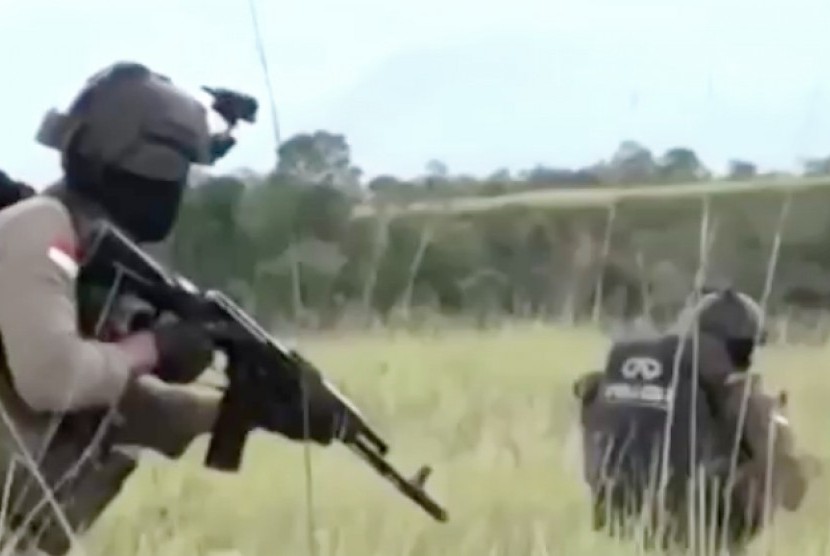REPUBLIKA.CO.ID, By: Stanislaus Riyanta*)
Santoso, alias Abu Wardah, born on August 21, 1976 in Tentena, Poso, Central Sulawesi, was shot dead by members of the Tinombala Task Force on July 18, 2016. Santoso’s life was terminated by a shot of a soldier from Raider Battalion of 515 of the Army Strategic Reserve Command. Santoso, who was the son of migrants from Java, was the most wanted men by security forces for his disturbing terrorist activities. He committed some Fai (robbery) and police murders because he and his group considered the police as thagut.
The death of Santoso was an achievement. This success proved that the cooperation between the Police (Polri) and the Military (TNI) in Tinombala Task works well in accomplishing the primary mission to find and arrest Santoso and his group. Tinombala Task Force proves that terrorism cannot be tackled alone by police. There are special conditions in which the role of the military is more appropriate, such as the hunt for terrorists in the forest that requires the skills of guerrilla warfare, or in the conditions that requires long term logistic supports. These situations are likely the specialization of the military force.
After the death of Santoso, will the terrorism threat be vanished? No. Terrorism is the product of radical thoughts internalized into someone’s mind. These radical understandings (ideology), meeting with the supporting environment, training, logistics, finance, leader / figure, weapons, and a momentum to conduct some actions leads to a terror act. The death of Santoso only weakens one of the leaders of radical groups in Indonesia. Yet, the root of terrorism, radical understandings in the minds of many people, still remains.
Poso was not the only area where the radical groups are hiding. Santoso and the Eastern Indonesian Mujahidin (MIT) are not the only people and group bearing radical understanding of terrorism. In Indonesia, there are many cells of radical groups that have potentials to perform terrorist acts such as Jemaah Ansar Khalifah Daulah Nusantara (JAKDN), one that committed terror bomb of Thamrin on January 14, 2016 and the suicide bombing in Solo on July 5, 2016. The group is based in Java and is also very dangerous. In addition to multiple cells in Java, radical groups also exist in Bima.
The success of Tinombala Task Force to kill Santoso will not stop the remaining terrorist groups. Instead, Santoso's death will only make the urge to commit acts of terror even greater. The radical thoughts will then be mixed with the urge for revenge. This will be very dangerous.
The logics of Balloon Theory suggests that a pressure in one place would lead to development of the problem elsewhere. This will likely happened regarding the radical groups. Pressure in Poso and Bima has developed the radical groups in Java. Cells in Java will retaliate especially since there will be some of Syrian fighters originally from Indonesia returning to the country. Former combatants from Syria are certainly very dangerous because they have the capability and strong ideology.
Acts of terror as the form of retaliation and backlash by the radical groups especially those affiliated with ISIS should be wary of. Santoso is the leader of a radical group that has pledged its allegiance to ISIS. Santoso's death would be heard by ISIS in Syria. Acts of revenge and counter-attacks will most likely occur.
ISIS is certainly not reluctant to fund this action, as happened in Thamrin bombing and some suicide bombings in which Bahrun Naim, an ISIS figures in Syria originally from Indonesia, was involved.
The radical Group that are ISIS sympathizers in Indonesia will prepare detail plan for revenge. They will also consider cheaper and safer models of terror as happened in Nice France on July 14, 2016. An attack by crashing a large vehicle into a crowd is cheaper and more difficult to predict. This model of terror will possibly be chosen by the radical groups to avenge Santoso’s death.
Apart from the urge for revenge, the cells of radical groups must also want to prove themselves. This is needed to show the funder (ISIS) that they have the capacity to become ISIS leader in Indonesia and Asia in general. This existence motive will lead to a big act of terror that will attract the attention of ISIS officials in Syria. ISIS in Syria is expected as the main funder or sponsor for terrorist acts that based on ideological interests in Indonesia.
The death of Santoso will not stop the radical groups conducting attacks. In fact, the incident will motivate them to revenge and backlash. The targets will most likely be the police who they considered as their main enemy in Indonesia.
The security officers especially police, thus, must be wary of the possibility of an attack without weapon. They might copy the Nice attack by using a vehicle. If the police headquarters have tightened its security, they might choose other targets such as boarding house, police stations, or regional police headquarters whose security are relatively weaker.
There are likely three scenarios for the attacks. First, the regular scenario in which police headquarter will become the main target. The second scenario, as an alternative, they will target police station or boarding house. Last scenario, the emergency one, they will target crowd of people, western symbols, or praying house.
Santoso is not the main and the only character within the terrorist groups. There are still a lot of radical cells that exist in Indonesia, especially in Java and Bima. Acts of revenge and counter-attacks must be wary of. The more important thing is the arrest and prosecution of terrorists must be balanced with the de-radicalization program for families and the environment of the radical groups. Deradicalization is supposed to be able to prevent ordinary people become radicalized because of the handling of terrorism that hurts them and leads to some revenges.
*) An analyst commencing study at Intelligence Strategic Analysis Program at University of Indonesia.



